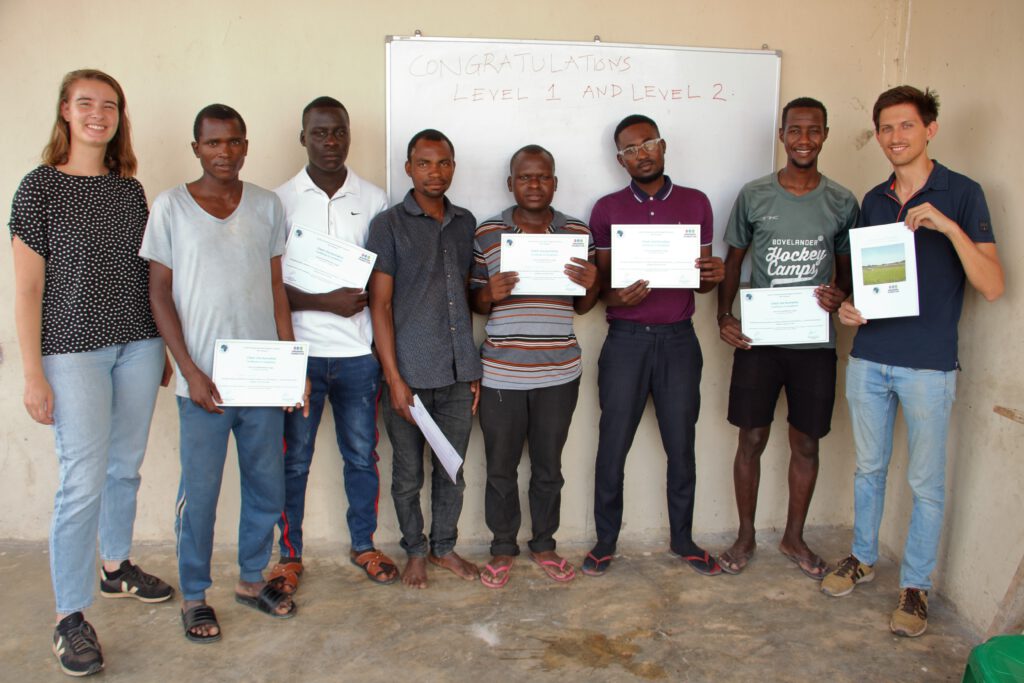Judith Kavelaars and Rembert Kortenhorst

Through the network of Otto Kroesen we, Judith Kavelaars and Rembert Kortenhorst (both recent graduates from the TU Delft), have got in touch with YEP Tanzania. YEP stands for Youth Entrepreneurship Program and it is active in Arusha for professionalising existing small businesses and in Misungwi for teaching agricultural entrepreneurship to underserved youth. It is the latter which we have volunteered for in the last 10 months.
First a few words about the agricultural entrepreneurship project. Every year, approximately 12 youth start the program that nominally takes 2.5 years. Opposite to the household farming that you see a lot in Africa, here they learn commercial farming. So in this program they not only learn farming skills, they also learn entrepreneurship. For the project, YEP owns a farm with facilities to grow crops on the open field or in the greenhouse and at which the participating entrepreneurs to be can live. The farm is located in a very small village 12km away from Misungwi. YEP itself is run by the Dutch founder Jeroen, but this project is under the management of the Tanzanian manager Andrew.
When we arrived in Misungwi ten months ago, we knew we had quite some time for the project and Jeroen and Andrew let us free in finding where we think we can contribute with the background and skills we have. Therefore, we decided it is best to first gain a good understanding of the project by taking some months to do a project analysis. This not only helped for our own understanding, but also to find some blind spots for Jeroen and Andrew and to prioritise on what our contributions can be. The project had not seen an extensive evaluation since its start in 2016.
First of all, we saw it is valuable to continue to support Andrew in his managerial activities as this not only develops him further, but also has a direct impact on the project. We supported him in structuring his work (managing well in the African context, is very demanding), in administration and in reporting of the activities at the project.
Secondly, we have developed a curriculum together with Andrew. There already was a broad idea in which the program was split up in three levels, but clear learning goals, any planning, list of lessons or assessment method were lacking. All of this is present now and the participating entrepreneurs were very happy to receive certificates for the levels they have finished! All this should bring more structure in the teaching activities but should also motivate the entrepreneurs throughout the program as they now know what they are working to.
Lastly, we have done a fundraiser among our friends and families. We noticed that the more experienced entrepreneurs were not staying much at the farmhouse as they thought the living circumstances at the farm were too basic and their standards have increased. This is a great shame as especially they can inspire the others. Also, as there was no light or electricity, the entrepreneurs did not socialise much in the evening as they would just lay on their beds staring at their phones. For this we came up with a package of improvements: a solar system to provide light, electricity to charge their phones and even television; a white-board in their common room to be able to review the trainer’s notes from the last lesson; two bicycles to not have to walk 3 hours to Misungwi; a kitchen to not have to cook in the burning sun on illegally collected firewood; connecting the building to a septic tank to be able to shower and use the toilets; lights to illuminate the fields to prevent animals coming in at night to eat the crops; and at last paintings to communicate the main elements of the curriculum.
Together with Andrew, we live in the YEP house in the small town Misungwi. In this town we are the only western people and it has been a very interesting and heart-warming experience to live here and socialise with the people here. In the beginning, we could miss our standards of comfort, but after a while this completely disappeared. First, we really needed to visit more western places in the city of Mwanza (1 hour away), later it felt like coming home in Misungwi after the busyness of the city.
We believe we have made a contribution to the project and know it is in good hands with Andrew. The combination of theoretical and practical work in a different culture has challenged us, but also has brought us many great experiences. But above all, we have learned a lot. We believe there is so much value in the warm, African way of doing. The western ways are not at all the best or most logical. We hope that in the development of Africa, it does not grow to be like the western world but that it keeps its beautiful values whilst eliminating much of the hardship that is now there.